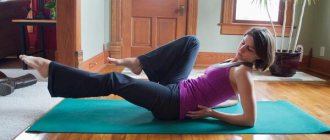Living here and now means the ability to turn off thoughts about the past and future, transferring the focus to the present moment. In this state, anxiety disappears and confidence appears, a feeling of harmony and happiness arises, and answers to all questions are found.
In this article, I will not only offer you one of the easiest ways to be here and now, but also show with examples what results you can get in the first week of training.
Important! Click on the link and learn 5 secrets of fulfilling any desire from Elizaveta Volkova >>>
Live here and now or live one day: what's the difference?
Sometimes the principle of “here and now” is taken literally: live for today, and tomorrow there will be a flood. This is not true. Conscious presence in every moment of your life is more like the detachment of an observer who sees the whole picture. Yes, the past no longer exists, and the future has not yet arrived. But this does not prevent the observer from analyzing yesterday’s experience and planning his “tomorrow”.
However, if you have at least once tried any of the practices of being present here and now, you have already realized that this is not at all like the habit of living one day at a time.
Stopping attention in the moment “here and now” is the first step to developing awareness. The sensations that you experience cannot be confused with anything: they are often described as a feeling of freedom and happiness, wholeness and fullness of life, reunification with the inner “I”.
Each spiritual teacher explains this state in his own way, since awareness is easier to feel than to convey in words.
In you, as in other human beings, there is a dimension of consciousness that is immeasurably deeper than thinking. It is the very essence of who you are. We can call it presence, awareness, unconditional consciousness.
Eckhart Tolle "What Silence Says"
Self-remembering is inconspicuous. The Higher Self perceives both itself and the observed objects at the same time.
Robert Burton "Self-Remembering"
Watch every action you take. Observe every thought that passes through your mind. Observe every desire that comes over you.
Osho “Mindfulness. The key to life is balance"
What trains, develops - the more you practice mindfulness, training the ability to live here and now, the longer you manage to stay in this state.
Let's get down to the simple steps you can take to get started today.
On the subject: TOP 100 books about the power of thought
Station "Past"
The past... is simply a set of circumstances and events that have already ended, just as the camra in this jug ended. We'll be fine if we try to drink it again! There is nothing to drink there, the jug is empty.
Max Fry
“Many of us first imagine what they would like to do in the future, for example, hold the next meeting,” says analytical psychologist Tatyana Kabluchkova. — When a meeting passes and it’s not possible to do it the way you wanted, the situation that has already happened is replayed in your head. It plays out how everything could have been turned around to have a different outcome. The result is self-attack, melancholy and a sharp decrease in self-esteem.
There is an obvious unconscious barrier to expressing oneself in the present when in contact with other people. When a person is alone with himself - before or after a meeting - he feels well what he wants, what his benefit and goal are in the upcoming contact. For example, negotiations with your boss about a salary increase, or even a conversation with a friend about your own affairs, and not about hers. A person can clearly imagine how he communicates his needs to another and what he does to satisfy them.
But images and ideas are not yet embodied reality, continues Tatyana Kabluchkova. “No one around us sees the images. Therefore, in an imaginary situation, it is not scary to talk about yourself and show yourself as you are. In real contact with another person, your own desire is lost and in its place is put the desire of another, to which you can simply assent, and then you will not be noticed - will not be devalued, will not be rejected.
It is the fear of devaluation and rejection that underlies such conformist reactions. It is rooted, of course, in childhood experience. Parents reacted to each individual manifestation of the child - a request or an active spontaneous action - either by devaluing the need: “Look for what you want!”, or by humiliating him: “Who are you to say such things to your parents!”, or by threatening: “You will do this.” , we’ll leave you here!”
Time passes, but the fear of how others will react to self-expression remains. And everyone with whom you have to communicate in such a way as to say something about your desires is automatically perceived as a criticizing, “beating up” figure,” explains Tatyana. “The pattern of interaction learned in the family is very persistent because it was the only option: it is perceived as normal and there are simply no other patterns of behavior in the imagination.
Some miss their carefree childhood, they are drawn to the city or to the yard in which they grew up. Others constantly remember the time when their children were babies and their parents were vital to them, constantly retelling “childhood stories.” Still others constantly think about past love. Why do people want to go back to their past so much?
“As a rule, such people are prone to depression,” says Mikhail Labkovsky. “They don’t like the life they have now, and they remember their past life. Those who have a hard time living as adults remember their childhood, how carefree, happy they were and how convenient everything was. Elderly people remember how they lived in another time, well, let's say, in the Soviet era. Because they are adapted to that life, they cannot find themselves in another, they feel like superfluous people.
Tatyana Kabluchkova, analytical psychologist
Four steps to conquering “childish” fears of self-expression
The first step is that you need to detect the moment when that very fear appears. You can only change what is visible, what a person is aware of! While this happens unnoticed by consciousness, nothing can be done.
The second step is to feel equal to the person you are going to communicate with. Even if this is a director, he simply occupies one of the positions in this organization, and as a person, as an individual, he has exactly the same rights to his desires as any other person. The position is higher, not the person, people are all born equal.
The third step is to clearly formulate your benefit in a given situation, in a specific conversation, and do and say only what will lead to its implementation.
The fourth step is after the meeting to interrupt the thoughts “Why did I do this and not that” with the only argument: it is impossible to return to the past, this is a physical law. Therefore, these thoughts need to be translated into planning, that is, turned into step-by-step instructions on how to act in the future based on the results of the meeting.
A simple technique “here and now”: read and try it right away!
Practice this technique in a relaxed state, otherwise you won’t be able to be here and now. If you're stressed, try to switch your thoughts to something else. Listen to music, remember a funny joke, take a few slow breaths.
Stage 1. Naming objects
Let your eyes wander and mentally name all the objects you see. This will force your attention to remain here and now, without mentally slipping into the past, but also without running into the future. If you see many identical objects, you can add color to the names. For example, blue car, white car, yellow leaf, green leaf. But it is important not to give them subjective assessments (old, fresh, tall, small, and so on).
Simply record what you see as dispassionately and objectively as possible. Evaluation refers to the past or future, but it is important for us to be here and now.
When this stage starts to work out well, move on to the next one (or do both at the same time).
Stage 2. Feeling yourself in the world around you
Remember yourself - “Here I am, I’m alive!” - and the rest of the world exists separately. Observe the sensations coming from all senses. Here and now, notice the touch of clothing, wind and rain on your skin. Here and now hear the singing of birds, the rustling of leaves, the sounds of the city. Feel the tastes, smells and temperature here and now. Observe the world around you as an alien arriving on Earth for the first time.
A life hack about an alien
is my favorite childhood pastime. I combine it with the practice of mindfulness : this makes it easier to separate flies from cutlets, and the outer world from the inner. Just imagine that you are from Mars, Venus or the Tau Ceti system. You are inside the spacesuit - in your body. Everything outside is a completely separate alien world from you. It’s especially nice to imagine yourself in such a spacesuit here and now , when it’s rain, wind and dirt outside.
This is roughly how newly born children behave when they look at their fingers, remember? Speaking of children...
Mindfulness is familiar to everyone. We just forgot how to do it.
My very first memory dates back to the age at which children do not yet know how to walk - until they are about a year old. I'm in a nursery, lying in a crib with bars and watching two nannies in white coats. Now I barely remember what they talked about, but it’s not that important. And it is important that at that moment I was in a state of awareness, clearly and impartially recording events. I realized this many years later, when I began to learn to be here and now. It turns out that we really can do all this, we just need to remember.
Stage 3. Turning off internal dialogue in the “here and now” state
Some time after completing the first two stages, you will have a feeling of emptiness and such freshness in your head, as if it had been ventilated. Well, or just an unusual condition. This is a signal that you are doing everything right on the path to awareness. In this case, the internal dialogue will turn off by itself (it may not work the first time - be prepared).
By the way, don’t try to do anything with extraneous thoughts. It is useless to fight them, and trying to observe them, as many spiritual mentors recommend, is not so easy.
Thinking cannot be stopped - not that it does not stop, but it cannot be stopped. It stops on its own. This difference needs to be understood; otherwise you may go crazy chasing your own mind.
Osho “Mindfulness. The key to life is balance"
On topic: Osho. Courage: the joy of living at risk
Don't pay too much attention to your thoughts, and they will actually begin to disappear on their own over time, once you become more familiar with the practice of “being here and now.”
At first, you may find it difficult to maintain a state of mindfulness for a long time. Don’t worry if during your first attempts you will be “knocked out” into normal life within a minute. Set yourself a goal: gradually increase the frequency and duration of sessions.
Set an alarm on your phone for 4 times a day (or more) to help you remember to practice and track your results.
Get free instructions on how to make your wishes come true while access is open >>>
And one more life hack, this time from Robert Burton:
Paradoxically, one of the best ways to prolong self-remembering is to not try to hold onto it. When unusual productive states arise, try to evoke within yourself a working self that says, “So be it.”
A 3-minute meditation break for every day to develop mindfulness
There are excellent meditation breaks. They can be performed throughout the day to focus attention on the present, our own thoughts and feelings, which we often neglect. Such exercises will take you no more than 3 minutes of time, which means they can easily be done at work, in a traffic jam, or in a queue.
Stage 1. To begin, sit up straight, straighten your shoulders, straighten your back, and take a comfortable position. It's best to do this with your eyes closed. Direct your inner eye to what is happening inside you. Accept it, don't try to change it. Answer simple questions: how do I feel now? What am I thinking about? Present it clearly.
Don't be afraid to admit your own thoughts, even if they are disturbing and frightening. Do the same with your physical condition. If you feel discomfort or pain, admit it to yourself.
How to increase income
at least
3 times
without reaching and plowing 24/7
How to increase income
at least
3 times
without reaching and plowing 24/7
The most effective practices from Maria Samarina, thanks to which more than 100,000+ people have already increased their income and fulfilled their material desires
The results of our students can be seen here
Download instructions and videos while access to materials is open. It can be blocked at any minute!
Maria Samarina Founder of the largest online school of mindfulness “Potok”
7 reasons why you can’t break through the financial ceiling
We'll tell you which habits are destroying your resources.
Video practice on attracting money into your life
Effective meditation to increase financial income
A simulator for finding true purpose that gives a flow of money
Unlocking Your Maximum Money Potential
Activating practice to expand abilities
Which will help you quickly achieve your goals
Download the selection
Already downloaded 100
Step 2: Now choose a point and concentrate on it. Then direct your sensation to the space in the abdomen - the abdominal wall rises as you inhale and falls as you exhale. Live every inhalation and exhalation as a pause that will allow you to see and feel every moment of life that arises somewhere inside.
Stage 3. The next step is to expand your attention from the breath within yourself to the whole of you. Feel your body as a single whole, as if your whole body is breathing, filling up at the same time. Clearly imagine how you sit, how you hold your hands, how all the wrinkles are straightened, how all the muscles of your body are relaxed and filled with oxygen.
If you feel discomfort or pain, then direct your attention there, breathe with this place, accept this feeling. Having made friends with your body, do not try to change or drown out your anxieties and fears, speak them clearly. Return to the beginning, continuing to monitor your breathing and listen to the signals your body is giving.
What happens if you exercise four times a day?
The topic of mindfulness is being actively discussed online, and I recently came across this question:
– How do I understand if I’m really
here and now , or if it just seems to me?
It is very easy to determine this if you have criteria - what results to expect from this method and when.
Try regularly practicing the suggested “here and now” technique, just four times a day. Within the first week you will discover something like this (perhaps in this order):
- Stress levels will decrease
This exercise once pulled me out of a severe depression in just one set. Those who have experienced depression will appreciate how great it works.
- More energy
There are many options to recharge your energy, but it is the mindfulness mindset that I use most often, because this method is simple and accessible. And, as a bonus, your mood rises and a feeling of happiness comes.
- You will become clearer about what you want from life.
Being in the “here and now” moment, you may find that your previous goals no longer warm you, and the focus of attention has shifted to something else. This is exactly what happened to me, by the way. Thousands of people attend trainings and buy books to understand their purpose. And you just need to look inside yourself - into your spacesuit...
- Glimpses of intuition will appear
For example, as soon as you think about a certain person, suddenly he calls or accidentally meets on your way. Don't treat this as a coincidence. This is exactly how the first steps towards great changes begin!
Living here and now is much more interesting. If you use public transport, you will soon start “ordering” the bus you need. If you have a car, a space will be freed up right before your arrival, even in a densely occupied parking lot.
On topic: Mindfulness is the key to living in balance
Recommendations
1.Why?
Every time you realize that you are hanging on events that happened a long time ago, ask yourself why you need this? Why, for example, have you held on to the idea for years that men are the same and nothing good will happen around them? Because there was a negative experience in the past? Or are you satisfied with your loneliness and just find such an excuse? So, to be here and now is to be honest with yourself, it is to be ready to take risks to live, which means trying again and again, or accepting yourself as you are.
2. We must learn one truth - everything changes
And so do we, every day. And if yesterday I said that someone is incredibly dear to me, then today he may no longer be so significant to me, and this does not mean that yesterday I was lying. Everything just changed today. What I mean is that you should be able to notice yourself and allow yourself to be. Life is not static, it is in constant dynamics and movement, so you shouldn’t “punish yourself” for changes.
3.Feelings of self
To notice yourself in reality, you must perform many functions at the same time, so to speak, be Julius Caesar. What does it mean? And the fact that in addition to the surrounding reality, you should also discover yourself, that is, your thoughts, feelings, sensations in the body, audible sounds. It is not simple. Especially so as not to tie it all to past experience. Take it gradually, and over time you will be able to balance all the incoming information.
For example, set aside 15 minutes a day to do this exercise: sit on a chair, and for 5 minutes just look, silently saying to yourself everything you see in front of you, around you, starting the phrase “I see.” You'll be surprised how many details you haven't seen before. Then also, just concentrating on the sounds. And finally, you will need to listen to the sensations in your body, feeling every centimeter of it.
By the way, meditation helps me with this. You can read about it here.
4. Finally, give up the method of putting everything off until later
After all, how can you learn to be in the present when you deprive yourself and ignore your needs? This tomorrow may well not come, or may not be relevant. This also applies to shifting responsibility, or rather, trying to avoid it by making promises to yourself to change from Monday. Got an idea to do something? Then immediately take action, otherwise it is unlikely that your plans will become reality.
Have you bought a beautiful set? Use it now and have fun, the same goes for the rest, waiting for the right opportunity. You are responsible for your life, and you have the right to organize various events in it.
5. Listen to yourself right now, what do you want?
And how realistic is this desire to realize at the moment? What do you get pleasure from? How do you relax? Now remember, when was the last time you allowed yourself to relax and do exactly what you wanted?
6.Replacement of reality
I would like to strongly recommend that you get rid of the habit of “hanging” on the Internet, “disappearing” while watching TV. These are killers of your time, which disappears unnoticed. Look around - the present is sometimes not as beautiful as in the virtual world. I have already written an article on this topic “What to do if your life is spent on social networks and how to overcome this problem?”
7.Process
Your high ambitions and motivation to achieve are wonderful, but it is very important to enjoy the process, so you should not focus only on the result, learn to pause and notice, do you like what you are doing? And if not, then make an effort to find an opportunity to enjoy your activity, to find something good and pleasant in it.
8.Little secret
If you remember, in the article about aerophobia, I suggested using a money rubber band on your wrist to switch from irrational fears, returning to reality. This method also turns out to be effective in cases of excessive fantasizing and avoidance of the present. So, every time you notice that you are not in the moment, but somewhere far away, pull back the elastic band and let go, so your consciousness will switch, and your body will cheer up.
9. Judgments
By the way, recently, in an article about the deductive method of Sherlock Holmes, I talked about the importance of without value judgment, that is, when we simply observe and do not give a subjective assessment of what is happening.
10.Practice before bed
Every evening, before going to bed, try to highlight and name 10 things that happened to you during the day and caused pleasant emotions. Perhaps you did not attach importance to some events before, because human nature is such that he notices the importance of processes only when they stop working. We don’t have to go far, we are not aware of our breathing, although if we block the access to oxygen, we will understand how vital it is for us.
This is very good practice. Personally, I did this: every night before going to bed, I remember 5 things I have done for which I am grateful to myself. And then I tell myself 5 things that the next day I will do better than ever. I wrote more about this in articles about my goals. Here is a link to the section with all the articles and reports about my achievements of goals.
How Mindfulness Attunement Works
It's simple: when we stop worrying about the events of the past and worrying about the future, the stressful state disappears by itself, like the morning fog. It just doesn't have the fuel anymore.
When we are here and now, the mental mixer in our head turns off and a huge amount of energy is released. This energy does not disappear into emptiness: you feel it as cheerfulness, a thirst for activity and a good mood.
When we immerse ourselves in contemplation, even more amazing things happen:
If you just sit and observe...over time your intuition blossoms and you begin to see things more clearly and be more in the present. Your mind just slows down and suddenly you see a huge space. You see a lot more than before.
Steve Jobs
A state of awareness, presence here and now, turning off internal dialogue - all this is the same proven way to open the door to your Subconscious. Of course, this area is in many ways still Terra incognita, but we can use some properties of the subconscious today.
What is mindfulness
Awareness can be considered a practical state of body and spirit, which includes two parameters: “here” and “now”. The state of “now” indicates time to us. We are familiar with three concepts: past, present and future. “Now” is a synonym for the present - what is happening at the current moment. When the mind is focused on the present, the understanding of “here” is automatically activated - this is an object, emotion or situation that fills our consciousness.
The state of awareness is a constant companion of childhood. Kids are not yet familiar with the concept of time, do not worry about the past, and do not worry about the future. The child enthusiastically examines a blossoming flower, a huge puddle, a crawling insect, giving himself completely to this process. Gestalt therapist Galina Kamenetskaya is of the opinion that children of host parents retain the ability to live in the moment throughout their lives.
What our Subconscious can do
Imagine a car with a driver at the wheel and a navigator that says in the voice of Fyodor Bondarchuk: “There are road works ahead in the left lane” or “You have gone off route, this is not according to the script.” So, if you compare your body to a car, then your mind (or your consciousness) is the driver who sits behind the wheel. And your Subconscious can be considered a navigator, which sees all the paths and knows how to achieve the goal.
If you know how to live here and now, then the Subconscious will always tell you the right route and help you reach the Universe.
On the subject: How the subconscious controls your life
Put down your gadgets
Seneca wrote that people are most protective of money and property, but are careless of the one thing they cannot get back: time.
“It’s not that we have too little time to live,” he said, “it’s just that we waste too much of it.” Can you imagine what he would say about people who spend an average of more than five hours a day on gadgets? That's 76 days a year, about 11 weeks, and a ton of unproductivity.
In Digital Minimalism, Cal Newport explains that the designers of gadgets and social networks are not your friends, and you are not their client. You are the product they sell to advertisers, applications, and database owners.
The average user accesses their mobile device more than 2,600 times a day. What if instead, on at least a dozen occasions, we picked up a magazine, a book, got down to work, talked to a loved one? By spending these five hours productively, you can do much more useful things.
How does the “here and now” state manifest itself? Examples from life
I promised to share personal examples of what the first results of the practice of being present here and now can be. Here they are.
Story No. 1. Reading information from outside
I mind my own business and don’t bother anyone. Suddenly, a first and last name - completely unfamiliar - come to mind from somewhere. A couple of hours later I find myself next to the TV and the “News” sadly reports that an actor with the same name and surname has died. I had seen the actor somewhere before, but I didn’t know his name.
This incident struck me greatly, which is why I remember it. In general, when you begin to be here and now, answers to questions that currently haunt you come in a similar way. They just appear in your head, literally out of nowhere, and that’s it. Watch this.
Story No. 2. Sharpening intuition
I'm in the supermarket, looking for a bag of nuts. There are all kinds of snacks on the shelves, but mine are gone, they're all gone. And I desperately need these nuts, right here and now. And suddenly a certain state, previously unknown to me, covers me, and my hand somehow, by itself, with a precise movement, reaches deep into the shelf, pushes the bags apart and pulls out the penultimate one.
Have you guessed it yet? These were the same nuts. And they were the only ones on the shelf, I checked - they got stuck in there by accident. My mind couldn't know about it. But intuition knew.
Story No. 3. Fulfillment of desires
My wish was a luxurious manicure. I usually make an appointment with my favorite master in advance. But then the family budget was so tight that there was no money left for a manicure. “Next time...” I thought. "Here and now!" - decided the Universe. And I instantly receive an offer to do a manicure four times cheaper than usual, because the master needs a model to practice a new technique.
This is how wishes gradually begin to come true. At first modest, everyday ones. Then - be bolder.
So what is next…
Misconception
Many people incorrectly interpret the principle of “here and now” as a call to stop planning for the future and let things take their course. In fact, the boundaries of past, present and future are blurred and changeable. Philosopher Artemy Magun believes that the present can be called that period of time that we can influence. For example, we think about a vacation planned in a month and, based on this, we build the present: we read articles, pack a suitcase, buy tickets.
The ex-wife of Vladimir Kristovsky about relationships after divorce
Harvest ring: a neighbor taught how to properly “wake up” potatoes
Myasnikov warned Russians about the outbreak of a dangerous disease due to the Covid epidemic
If tomorrow it was announced that a meteorite was flying to Earth, then the need to reflect on the failures of the past would disappear by itself. We would appreciate every breath and every moment, knowing that there are not many of them left. Imagine that every flutter of your eyelashes captures the world around you in the current moment, like a camera. You will see many new details: a fancifully decorated door of a neighboring house or a nest made by birds on a nearby tree.
What will happen to you next?
If you practice the ability to be here and now every day, then over time, moments of awareness will begin to arise spontaneously and more often. You no longer need to play the game “name the object”: the sensations will become stronger and more beautiful without it.
Subsequently, you will learn to enter the presence mode here and now literally on the go and even during a conversation. Imagine, you were called to a showdown with your superiors, and you are calm, like Buddha. You watch the whole conversation from the side, like Fyodor Bondarchuk in a navigator - there’s an accident, and there’s a traffic jam, we’ll go around here. And it’s no longer the boss who controls the script, but you.
When I first started being present, I couldn't speak and be present at the same time. It took a while before I learned how to do this.
Robert Burton "Self-Remembering"
Don't try to be perfect
One of the things that creates problems in finishing or starting things is waiting for inspiration or setting a high bar. As Churchill said: “Perfection may also be called paralysis.”
If you want to live fully, you will have to accept the imperfections of the world. There will be no ideal. To progress, you need to go forward.
Productive writers know the four lousy pages a day rule: they sit down and write about anything, even if they think it's no good. This technique gives impetus and relieves work stupor, so just work regularly. Come up with a similar ritual for yourself.
Important nuances
- Notice random coincidences
When you are in the “here and now” state, accidents are not accidental. There is such an observation: if you do not listen to the prompts of intuition and do not rejoice at the gifts of the Universe, then this source will dry up over time. By the way, it also works in the opposite direction.
- Be sure to raise the bar
Be prepared that the changes will be small at first. Gradually increase the duration of practice and the number of approaches per day. The skill of mindfulness is trained like triceps or Brazilian glutes - that's a fact.
Awareness grows very slowly, but it grows. A person must be very patient.
Osho “Mindfulness. The key to life is balance"
Take a master class on fulfillment of desires from Elizaveta Volkova and find out what can interfere with the fulfillment of your desires >>>
Safety precautions for practice “here and now”
You can learn to live here and now while walking, in the gym, at business negotiations, on the subway... almost everywhere! But you can't do this while driving.
While you're stuck in traffic, exercise for your health. But it’s definitely not worth it while driving. It is generally not advisable to do any practice while driving. By the way, I tried to be here and now behind the wheel. I do not advise.
Being in an “alien state”, it is impossible to predict the development of the situation on the road. But this is exactly what the driver needs. If you wait for your trained intuition to start steering for you, then you simply won’t be able to wait.
Awareness of emotions and thoughts
Many people mistakenly believe that our emotions are caused by events that happen in our lives. It is easy to prove that this is not so, because in this case everyone would react to the same events in the same way. In this article about cognitive behavioral therapy, you can learn more about the principles of thinking and the influence that beliefs and thoughts have on our reactions. Here it will suffice to say only that the disturbing thoughts that often flash through our brain automatically are the very thing that ultimately causes negative emotions.
Accordingly, it is extremely important to be able to recognize the causes and consequences of our condition, to notice thoughts that frighten and worry us, making us feel sad, melancholy or angry. Observe your thoughts and the emotions they lead to. Try to do this without evaluation or criticism, simply looking at them from the outside if possible. This skill will help you get rid of the misconception that events directly cause negative emotions and affect bodily and behavioral reactions. By practicing this, you will learn to work with your subconscious and be able to live in harmony with yourself.
We also recommend that you familiarize yourself with the interesting techniques for improving awareness described in the video below.
Let's sum it up...
So, to learn to live here and now, you can start with the simplest steps. Not caring whether it works or not. Without being upset that attention floats to the side. Just do it every day, slowly raising the bar.
What else? Constantly monitor results. It will be great if you start writing them down. Re-read your notes in a year - and you will feel like a magician and wizard.
And it doesn’t matter whether you “ordered” the right bus or whether your intuition worked and you arrived at the stop when it arrived. Record any results and train the “here and now” state regularly. Then, over time, more complex practices will become available to you, very serious desires will begin to come true, and in general your whole life will change!
Write in the comments whether you are able to live here and now and what sensations arise in the process - this is important to track.
Do it now
Procrastination is the habit of putting things off until the last minute. And most of us do this. We tell ourselves: “I will definitely do it, but not now. I still have time this week.” Or we put things off under the guise of efficiency and tell ourselves that we will do them when we finish others.
As Steven Pressfield writes: “We never say to ourselves, ‘I won’t finish the symphony.’” Instead we say: “I’ll finish the symphony, I’ll just do it tomorrow.”
We may even think that delaying is better because we'll be rested and prepared, but waiting only makes it more likely that we won't do it at all.
You can't predict the future, so "now" is the best time to answer email, read a book, exercise. Don't waste it.
Don't leave things hanging
The Duke of Wellington, winner of the Battle of Waterloo, had a rule of taking things day by day. He did not leave things hanging or half done, but finished what he started. He didn't have 13 projects of varying degrees of completion.
Knowing that you need to finish what you start helps you prioritize and focus on what's important. And then you can say, “If I'm going to do this, I'm going to do it right.”
Thanks to this rule, my to-do list is short. I include the ones that I like, and I get great pleasure when I tear up the completed list in the evening. This helps you work harder. For me, writing a book is not one big project, but a series of small tasks. Technically the book won't be finished tonight, but I will write a separate chapter or part. And this will be the best thing I could do today.











